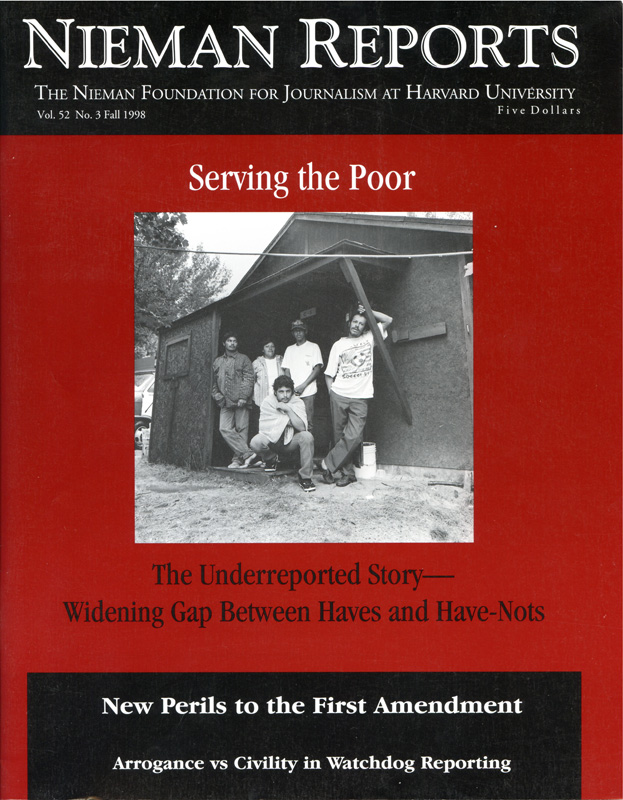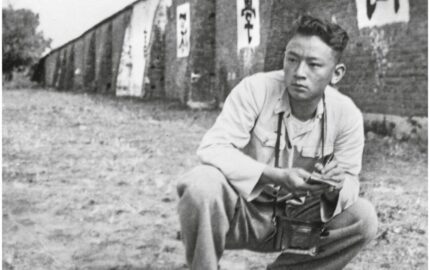In the flood of literature lamenting the demise of good journalism, this 102-page book is a small gem.
I do not say this because Pete Hamill, author and former Editor of New York’s Daily News, had promised to keep a job open for me when I quit the paper in July, 1997. Three months later, Hamill himself was gone, dismissed by the notoriously fickle publisher-cum-developer Mort Zuckerman, who has a reputation for high-profile hires and fires, revolving-door style. Hamill, whom The News featured in its television commercials as the quintessential New Yorker and perfect editor for the paper, lasted only eight months.
Written in the aftermath of his aborted editor’s career, “News Is A Verb,” is a critique of the news industry as much as an unfinished agenda for what Hamill had set out to do when he took over The News. Like a lover scorned, Hamill wrote with pain and pathos, baring his bitterness at the firing: “…we were going to put out the best god-damned tabloid in history. We were on our way. We didn’t get to finish the job.”
With the Lewinsky saga generating intense soul-searching among journalists, much of what Hamill said about the media has become familiar, that in its RELATED ARTICLE
"Verifying Truth in Data Deluge"pursuit to be the first instead of being right, rumor, innuendo and unattributed quotes from shadowy sources have taken over airwaves and seeped into even respectable broadsheets. At newspapers and the networks, international coverage is down and trivia is up. And veteran correspondents have joined the fray for sleaze, acting mean, petty and obsessed in a race for the inside scoop on some dirty laundry.
But in his critique, Hamill sets himself apart from most other pundits on two counts: his incorrigible faith in his fellow journalists, coupled with an undisguised disdain for media owners and their insatiable appetite for profits. He also offers ways that newspapers could remake themselves and survive in face of revolutionary technological changes.
Hamill, who began his journalism career as a night reporter at The New York Post, is no impassioned observer. He loves reporters, especially the tabloid man of old: “They didn’t pay whores for stories. They didn’t sniff around the private lives of politicians like agents from the vice squad. Even in large groups, on major stories, the photographers didn’t behave like a writhing, snarling, mindless centipede, all legs and Leicas, falling upon some poor witness like an instrument of punishment. Somehow, they found ways to get the story without behaving like thugs or louts.”
Yet these days, journalists not on the sleaze beat are finding it harder and harder to get their stories into the paper or on air, stories on education, the environment, the neighborhoods and so on, mundane bread and butter topics that readers would care and deserve to know. Moreover, newsholes are increasingly being taken over by what Hamill called “necrojournalism,” “the journalism of dead, or near-dead, celebrities”: Prince Di, Marilyn Monroe, John F. Kennedy, Jacqueline Onassis, Frank Sinatra, Marv Albert (“whose career was dead”), Donald Trump (“braindead”).
Yes, as reporters, editors and newsroom managers, we should push the limits, but to different degrees we are just pawns. When I returned to The News from my Nieman year in the summer of 1996, my first assignment was staking out a hotel at Kennedy Airport, where relatives of the TWA 800 crash victims had gathered to grieve. For two weeks, I joined the pack of reporters and hounded grieving relatives, chasing after them in parking lots and asking over and over again, “How do you feel?” I had a job to do and I tried to do it well. But there’s something wrong when by the end of the day I felt embarrassed explaining to my teenage son what I did at work.
Hamill suggests that to boost readership, newspapers need not pander to the lowest denominators. Instead, they should increase coverage of issues that attract women and immigrants, whose numbers are soaring in all major cities. In the two chapters on immigrants and women readers, Hamill seems to be writing from his editor’s notebook, or from minutes of meetings with Daily News editors. He tries to deliver a vision and road map that are part realism and part romanticism—57 percent of New York City’s population are immigrants or children of immigrants, yet what works for New York may not work for other parts of the country. It’s a valiant but less convincing effort.
But then journalism is more than marketing and survival. It’s also a sacred trust that the public has bestowed on this mythical community called journalists. My friend, Richard Reeves, author and newspaperman, often wonders aloud the fact that the public has never demanded licenses from reporters. Who gives us the right to ask questions of strangers and probe the country’s inner workings? What qualifies us journalists, some in our 20’s, to embark on tasks that could bring down the President of the United States?
They are the same questions that Harvard professor and author Robert Coles asked of his students—whom he called “the privileged ones”—as he led them in the reading of “Let Us Now Praise Famous Men,” by James Agee and Walker Evans. In the introduction to this classic work on the plight of Southern sharecroppers, Agee writes:
“Who are you who will read these words and study these photographs, and through what cause, by what chance, and for what purpose, and by what right do you qualify to, and what will you do about it?”
Who are we who are asking those questions and taking those photographs? And what are we going to do about them?
And it’s here that we must return to the whys and hows of our craft, basics of often-forgotten journalism wisdom that Hamill dispenses throughout the little book: that journalism is about “helping people” and keeping the country “functioning as a democracy.” It’s about telling interesting stories. It’s about verbs that give lives to sentences and to our news. It’s also about stopping the takeover by nouns and big-name celebrities.
Ying Chan is a consultant for Hong Kong University.
I do not say this because Pete Hamill, author and former Editor of New York’s Daily News, had promised to keep a job open for me when I quit the paper in July, 1997. Three months later, Hamill himself was gone, dismissed by the notoriously fickle publisher-cum-developer Mort Zuckerman, who has a reputation for high-profile hires and fires, revolving-door style. Hamill, whom The News featured in its television commercials as the quintessential New Yorker and perfect editor for the paper, lasted only eight months.
Written in the aftermath of his aborted editor’s career, “News Is A Verb,” is a critique of the news industry as much as an unfinished agenda for what Hamill had set out to do when he took over The News. Like a lover scorned, Hamill wrote with pain and pathos, baring his bitterness at the firing: “…we were going to put out the best god-damned tabloid in history. We were on our way. We didn’t get to finish the job.”
With the Lewinsky saga generating intense soul-searching among journalists, much of what Hamill said about the media has become familiar, that in its RELATED ARTICLE
"Verifying Truth in Data Deluge"pursuit to be the first instead of being right, rumor, innuendo and unattributed quotes from shadowy sources have taken over airwaves and seeped into even respectable broadsheets. At newspapers and the networks, international coverage is down and trivia is up. And veteran correspondents have joined the fray for sleaze, acting mean, petty and obsessed in a race for the inside scoop on some dirty laundry.
But in his critique, Hamill sets himself apart from most other pundits on two counts: his incorrigible faith in his fellow journalists, coupled with an undisguised disdain for media owners and their insatiable appetite for profits. He also offers ways that newspapers could remake themselves and survive in face of revolutionary technological changes.
Hamill, who began his journalism career as a night reporter at The New York Post, is no impassioned observer. He loves reporters, especially the tabloid man of old: “They didn’t pay whores for stories. They didn’t sniff around the private lives of politicians like agents from the vice squad. Even in large groups, on major stories, the photographers didn’t behave like a writhing, snarling, mindless centipede, all legs and Leicas, falling upon some poor witness like an instrument of punishment. Somehow, they found ways to get the story without behaving like thugs or louts.”
Yet these days, journalists not on the sleaze beat are finding it harder and harder to get their stories into the paper or on air, stories on education, the environment, the neighborhoods and so on, mundane bread and butter topics that readers would care and deserve to know. Moreover, newsholes are increasingly being taken over by what Hamill called “necrojournalism,” “the journalism of dead, or near-dead, celebrities”: Prince Di, Marilyn Monroe, John F. Kennedy, Jacqueline Onassis, Frank Sinatra, Marv Albert (“whose career was dead”), Donald Trump (“braindead”).
Yes, as reporters, editors and newsroom managers, we should push the limits, but to different degrees we are just pawns. When I returned to The News from my Nieman year in the summer of 1996, my first assignment was staking out a hotel at Kennedy Airport, where relatives of the TWA 800 crash victims had gathered to grieve. For two weeks, I joined the pack of reporters and hounded grieving relatives, chasing after them in parking lots and asking over and over again, “How do you feel?” I had a job to do and I tried to do it well. But there’s something wrong when by the end of the day I felt embarrassed explaining to my teenage son what I did at work.
Hamill suggests that to boost readership, newspapers need not pander to the lowest denominators. Instead, they should increase coverage of issues that attract women and immigrants, whose numbers are soaring in all major cities. In the two chapters on immigrants and women readers, Hamill seems to be writing from his editor’s notebook, or from minutes of meetings with Daily News editors. He tries to deliver a vision and road map that are part realism and part romanticism—57 percent of New York City’s population are immigrants or children of immigrants, yet what works for New York may not work for other parts of the country. It’s a valiant but less convincing effort.
But then journalism is more than marketing and survival. It’s also a sacred trust that the public has bestowed on this mythical community called journalists. My friend, Richard Reeves, author and newspaperman, often wonders aloud the fact that the public has never demanded licenses from reporters. Who gives us the right to ask questions of strangers and probe the country’s inner workings? What qualifies us journalists, some in our 20’s, to embark on tasks that could bring down the President of the United States?
They are the same questions that Harvard professor and author Robert Coles asked of his students—whom he called “the privileged ones”—as he led them in the reading of “Let Us Now Praise Famous Men,” by James Agee and Walker Evans. In the introduction to this classic work on the plight of Southern sharecroppers, Agee writes:
“Who are you who will read these words and study these photographs, and through what cause, by what chance, and for what purpose, and by what right do you qualify to, and what will you do about it?”
Who are we who are asking those questions and taking those photographs? And what are we going to do about them?
And it’s here that we must return to the whys and hows of our craft, basics of often-forgotten journalism wisdom that Hamill dispenses throughout the little book: that journalism is about “helping people” and keeping the country “functioning as a democracy.” It’s about telling interesting stories. It’s about verbs that give lives to sentences and to our news. It’s also about stopping the takeover by nouns and big-name celebrities.
Ying Chan is a consultant for Hong Kong University.



